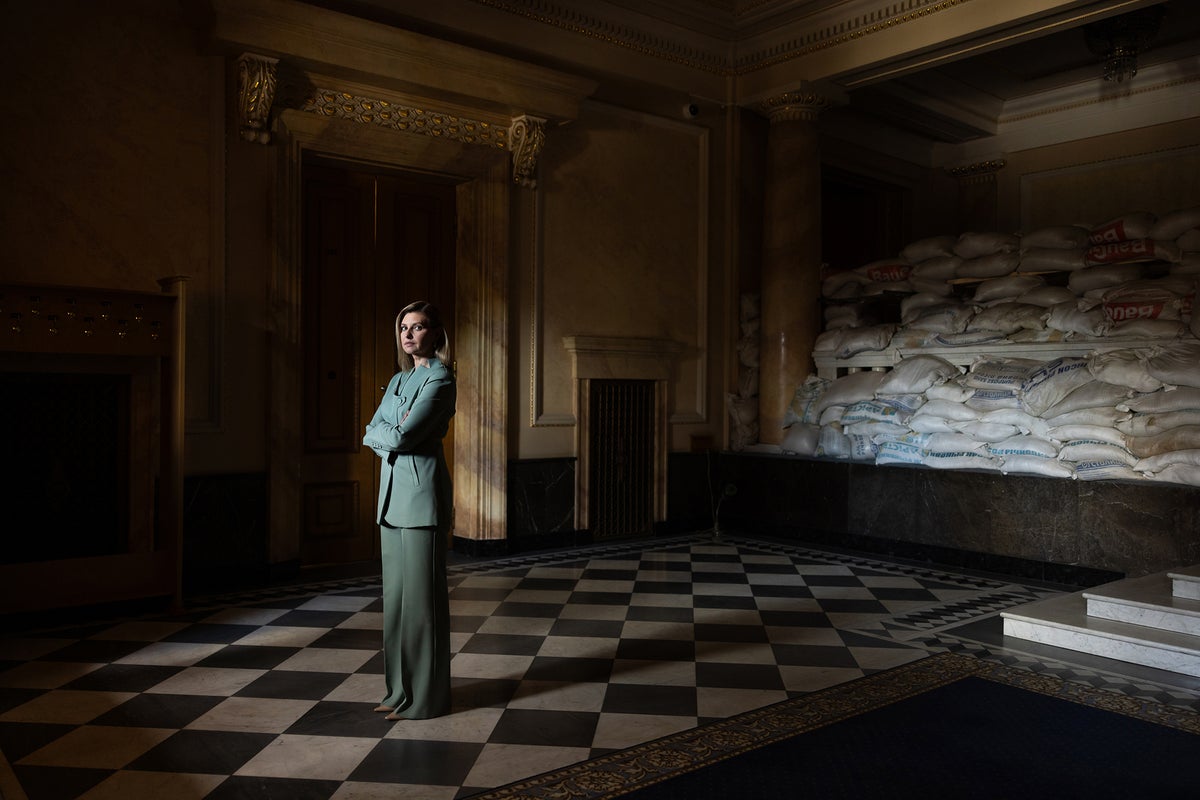
The government is reviewing its sanctions on Russia after a dramatic intervention from Ukraine’s first lady Olena Zelenska condemning loopholes that allow Moscow to fund its invasion.
The Foreign Office has expressed its fury over sanctions-busting efforts by Russian allies to use a third country to continue trading with Moscow despite the hefty economic measures imposed since Russian president Vladimir Putin launched his invasion.
The government is weighing how it can act and hopes to move imminently, The Independent can reveal.
Speaking exclusively to Independent TV from the heart of Kyiv’s presidential compound, Mrs Zelenska has called for an urgent crackdown on such trade to strangle Moscow’s funds – otherwise, its invasion risks dragging on “endlessly”.
Watch the full interview here
To combat Putin’s regime the world must impose hefty sanctions, and “terminate the possibility of circumventing these sanctions,” Mrs Zelenska said.
The foreign secretary, James Cleverly, immediately backed the first lady’s call. A spokesman for Mr Cleverly said the assessment the government has “echoes the frustrations the first lady has expressed about the use of third countries to circumvent sanctions”.
He added: “Not only is her a view a position we ourselves have already taken, we are right now working quickly but carefully to make the use of a third country as a ‘cut out’ far more difficult or indeed to try and stop it altogether.”
Mrs Zelenska thanked Ukraine’s partners for supporting the Ukrainian military in its fight against Russia, but said some nations were now undermining that effort. “There are countries that simply underestimate the threat from Russia who think that it is far from them. When there is such a powerful terrorist in the world, no one can feel completely safe,” she said in the rare interview.
“Some countries continue to conduct trade with [Russia] through third countries and think that this is acceptable because it is important for their business... I believe that this is simply and critically wrong.”
“Resources are being spent on this [war]. But resources will be spent endlessly until Russia's ability to wage war is stopped,” she added.
Mrs Zelenska did not specify which countries in particular were behind such deals, but officials in the UK elsewhere have spoken about regions such as central Asia and the Middle East. And there has been outreach towards countries like Turkey, Kazakhstan and Armenia to reduce the scope of third-country trade.
Mrs Zelenska, right, being interviewed by Bel Trew— (Anton Kulakowskiy)
During a trip to Kyiv in May, European Commission president Ursula von der Leyen warned that there was a “growth of highly unusual trade flows” through the EU to third countries and then onto Russia. In late June, the bloc agreed to fresh measures to try and do more to stop such third-country trade. But with agreement needed across the bloc’s 27 nations – a difficult task given the differing views between countries about what specific action is needed – such agreements can end up quite nebulous or not as comprehensive as Ukraine would like.
Earlier this month, the EU increased the scope of its sanctions on Moscow’s closest ally Belarus. The new restrictions included a ban on exports of goods and technologies which contribute to Belarus's military and technological enhancement, a ban on firearms, ammunition, and on technology related to aviation and the space industry. This is an example of targeted sanctions, but there is always the question of whether they go far enough.
Since Putin launched his invasion last February, countries around the world have slapped hefty sanctions on Russian officials and the state – including asset freezes, prohibitions on trade and travel restrictions – in a bid to weaken the war machine. But there will always be nations who will not get involved in such action, meaning there are always gaps to try and fill.
A government spokesperson said: “Alongside our international partners we have introduced the largest and most severe package of sanctions ever imposed on a major economy in response to Putin’s invasion of Ukraine. Non-compliance with sanctions is a serious offence and can be punished through large financial penalties or criminal prosecution. We’ve taken robust action to target those helping oligarchs to avoid sanctions including through an additional £50m to support sanctions enforcement.”
In the wide-ranging interview, Mrs Zelenska also pleaded with countries not to let war fatigue get in the way of continuing the vital support to Ukraine, which she said was paying to protect Europe “with the lives of our compatriots”.
The defence secretary, Ben Wallace, responded by vowing that Britain will back Ukraine “every way we can” until the war is over.
Zelenska inside the presidential complex in Kyiv— (Anton Kulakowskiy)
“No one in Britain is showing any signs of fatigue in supporting Ukraine, because it is the right thing to do,” he told The Independent.
"We are with them. And we will continue to be [with them], as I have often said publicly, to the end.”
Mrs Zelenska also opened up about the heartache Ukraine faced trying to retrieve its children forcibly transferred to Russia.
Ukraine estimates at least 19,500 children have been deported to Russia, but Mrs Zelenska said this was a woeful underestimate.
Russia has refused to cooperate with Ukraine, the United Nations or other international organisations – meaning Ukraine does not know just how many children are missing, the first lady added. So far Ukraine has managed to retrieve just 380 of the missing minors.
During the interview, Mrs Zelenska also announced that there will be new international cooperation between several countries to work on trying to locate and return the children. She closed by again urging the world to impose sanctions.
“All people in the democratic world should find opportunities to stop this aggression otherwise it can go on for a long, for an endless time,” she said. “This is too powerful, a big enemy, to simply deal with by only providing arms to Ukraine.”







